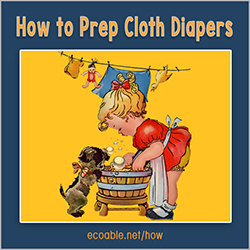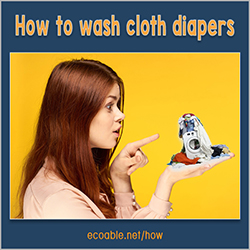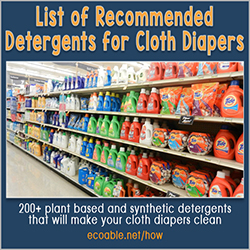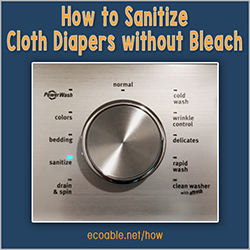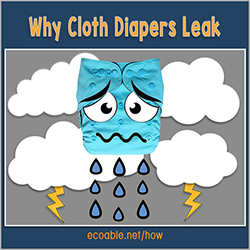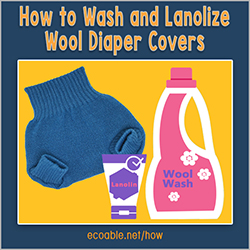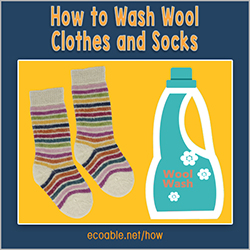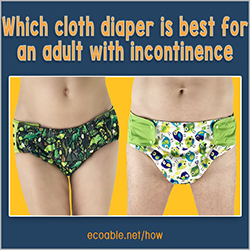How to Prep New EcoAble Cloth DiapersEcoAble cloth diapers are ready for use just after one wash with detergent. Because of the natural oils in the fabric, our cloth diapers may need multiple washes before reaching maximum absorbency. Never boil EcoAble cloth diapers and accessories. Avoid washing your diapers in very hot water and line drying outside on a very hot day. Hot temperatures can cause delamination, PUL cracks, plastic snap melting, excessive shrinkage and other damages. |
|
How to Properly Wash Cloth Diapers in HE and non-HE Washing MachinesAre you wondering how to properly wash cloth diapers and get the best results? This guide will help you to learn how to get your cloth diapers clean every time. In this guide you find instructions for High Efficiency (HE) washing machines and for regular non-HE machines. Click to access guide How To Wash Cloth Diapers |
|
List of Recommended Detergents for Cloth DiapersWe have listed 200+ of recommended Plant Based and Synthetic detergents, as well as laundry boosters that will make your cloth diapers super clean! You'll also find list of detergents that should be avoided. Click to access full List of Recommended Detergents for Cloth Diapers |
|
How to Strip Cloth DiapersAre your cloth diapers repelling? Or have you washed them in untreated hard water for too long? There are multiple situations when you may need to strip cloth diapers. Read our instructions guide for most effective solution: How to Strip Cloth Diapers |
|
How to Sanitize Cloth Diapers without BleachWe recommend avoiding bleach whenever is possible. Not only bleach is very toxic, it also can deteriorate cloth diapers much faster. Instead, we offer solutions with more gentle ingredients. Read our full guide here: How to Sanitize Cloth Diapers without Bleach |
|
How to Bleach Cloth DiapersThere are occasions when it is absolutely necessary to sanitize using bleach, for example when dealing with yeast infections or dealing with used cloth diapers. For such situations make sure to use bleach in proper dilutions to avoid any potential problems. Get full instructions here: How to Bleach Cloth Diapers |
|
Why Cloth Diapers LeakLeaking cloth diapers is a big reason why parents get frustrated with cloth diapering. Leaks happen occasionally, no matter what kind of diaper you use. With cloth diapers, persistent leaks are not the norm. Read our guide to identify and fix most common leaks: Why Cloth Diapers Leak |
|
Why Cloth Diapers StinkCloth diapers should not smell like ammonia or cattle truck. If they do, chances are your washing routine is not getting them clean. Luckily this issue is quite easy to fix! Check out our guide with solutions here: Why Cloth Diapers Stink |
|
How to Wash and Lanolize Wool Diaper CoversWool diaper covers are an excellent choice for your baby due to its ability to wick moisture away from the skin and absorb up to a third of its weight in moisture. To preserve the durability and water resistance of the wool cover, you should lanolize wool covers on a regular basis. Click to access instructions How to Wash and Lanolize Wool Diaper Covers |
|
How to Wash Wool Clothes and SocksUnlike other fibers, wool is odor resistant, meaning you can wear wool clothes multiple times before you start to get odd looks from people. A good airing out or spot-clean may be all you need for several wearings. When it comes to washing your wool garments, make sure to follow proper care instructions. Click to find out How to Wash Wool Clothes and Socks |
|
EcoAble Adult Cloth Diapers GuideIf you are beginning to research the modern world of reusable diapers, you are no doubt overwhelmed. Cloth diapers are the best thing for everyone. Even starting with just a few reusable diapers will have a huge positive impact on our planet. Every cloth diaper you purchase keeps one disposable diaper out of a landfill. Use this guide to find perfect diapering system for your special needs: Which Adult Cloth Diapers is Right For Me |

